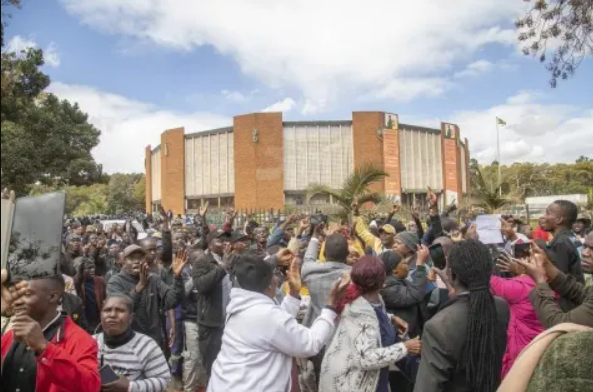Worries Raise Ahead of SADC Summit Over Zimbabwe’s Repression of Opposition
Concerns over the government’s increasing crackdown on opposition and civil society organizations have been voiced by the international world as Zimbabwe readies itself to host the 44th Southern African Development World (SADC) summit in Harare on August 17, 2024. Human rights groups are urging SADC to do something about the worsening political situation in Zimbabwe now that President Emmerson Mnangagwa is about to become chair of the subregional organization.
Human Rights Under the Mnangagwa Administration
Human rights abuses have been a recurring theme throughout President Mnangagwa’s administration since it took office in 2017 via a military takeover. There has been a consistent pattern of persecution, intimidation, and violence against opposition members and activists from civil society, according to observers. Because of this, the country’s civic and political space has shrunk considerably.
Major issues encompass:
1. Activists kidnapped and tortured
Assaults on political opponents through the criminal justice system
3. Opposition politicians’ protracted pretrial detention
4. False accusations against those who oppose the government, driven by political motives
The Latest Incidents Raising Worries
Worries regarding Zimbabwe’s human rights situation have recently intensified due to a number of events:
On June 16, 2024, police conducted a raid in Harare. Arrested at a private residence, over 70 individuals, the majority of whom are youths, are facing charges of disorderly conduct and intent to promote violence. Their attorneys assert that the event was actually a commemoration cookout.
2. June 27, 2024: Detainees from the June 16 raid had their bail denied. – There were reports of assaults and torture both during the arrest process and while in custody. – Police allegedly beat Court supporters.
3. Government accusations: On June 28, 2024, the minister of information stated that the opposition and civil society were trying to “incite disorder and discontent” and that the rights to peaceful protest as guaranteed by the constitution had not been addressed.
4. Five members of the National Democratic Working Group were arrested on June 29, 2024, in what the group alleges was an “unsanctioned gathering.” The group was organizing food distribution for the poor.
5. A memorial service for an opposition supporter slain in 2022 is disrupted by authorities on June 30, 2024, leading to the detention of several participants.
Structure of Law and International Responsibilities
It seems like Zimbabwe is breaking both local and international law with its actions:
1. The Constitution of Zimbabwe: Pretrial detainees’ rights, freedom of association and assembly
The right to be free from torture and other forms of cruel, inhuman, or humiliating treatment is guaranteed by the African Charter on Human and Peoples’ Rights.
Peaceful assembly and association are guaranteed by the International Covenant on Civil and Political Rights, which is the third point.
The Function and Possible Response of SADC
The South African Development Community (SADC) is under pressure to resolve Zimbabwe’s human rights crisis as the country assumes the role of chair:
1. Prompt critical changes to enhance democracy, rule of law, human rights, and respect for human dignity. 2. Bring Zimbabwe’s policies in line with the principles outlined in the SADC Treaty.
3. Think about contacting human rights systems in Africa to get more information about Zimbabwe’s responsibilities.
4. Demand a halt to the persecution of activists and those who support the opposition, including arbitrary arrests and prosecutions.
Moving Forward
Several possible actions could be taken to resolve the current situation in Zimbabwe:
1. Global Pressure: Expanded diplomatic initiatives to promote changes
2. Consideration of actions against those accountable for human rights violations as part of targeted sanctions
Thirdly, we must back civil society by increasing funding for groups that defend democracy and human rights.
4. Changes to the electoral system: Making sure everyone has a fair chance to vote
Fifth, judicial independence: making the courts better able to address human rights abuses
Everyone is waiting to see how the SADC regional body handles the worsening human rights situation in Zimbabwe as the conference draws near. In response to the global community’s demand for action, SADC has the chance to reiterate its support for human rights and democratic values in Southern Africa.
In order to promote peace, economic progress, and the upholding of fundamental rights for all citizens in the area, SADC must address these urgent concerns. The forthcoming Harare summit may be a watershed event in the history of human rights and democracy in Zimbabwe and abroad.



















